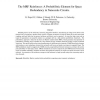Free Online Productivity Tools
i2Speak
i2Symbol
i2OCR
iTex2Img
iWeb2Print
iWeb2Shot
i2Type
iPdf2Split
iPdf2Merge
i2Bopomofo
i2Arabic
i2Style
i2Image
i2PDF
iLatex2Rtf
Sci2ools
MICRO
2006
IEEE
2006
IEEE
MRF Reinforcer: A Probabilistic Element for Space Redundancy in Nanoscale Circuits
Shrinking devices to the nanoscale, increasing integration densities, and reducing of voltage levels down to the thermal limit, all conspire to produce faulty systems. Frequent occurrence of both soft faults due to noise and signal coupling, and hard faults due to process variations and defects can be expected. As error-free logic states can no longer be guaranteed, one possible solution is a paradigm shift to a fault-tolerant probabilistic framework. The probabilistic approach is based on the theory of Markov random fields (MRF), which guarantees the optimality of probabilistic reasoning and is extensible to a large number of logic variables interacting locally in small, connected signal nets. This article builds on the recent demonstration of significant noise immunity of MRF based logic elements and introduces a new redundancy element that can handle soft errors and single event upsets in sequential logic. The MRF probabilistic model is mapped onto CMOS circuitry, using feedback be...
| Added | 14 Dec 2010 |
| Updated | 14 Dec 2010 |
| Type | Journal |
| Year | 2006 |
| Where | MICRO |
| Authors | Kundan Nepal, R. Iris Bahar, Joseph L. Mundy, William R. Patterson, Alexander Zaslavsky |
Comments (0)

